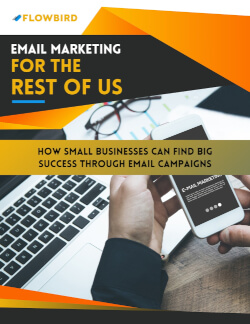The Beginner's Guide to Marketing Automation
Marketing automation has become increasingly popular in recent years. It's an invaluable tool for marketing, but it can seem like a minefield for small businesses. In this guide to marketing automation, we'll uncover what it is and how you can use it for your business.
So, what is marketing automation? It's the process of automating your marketing actions, usually using marketing automation software such as HubSpot or ActiveCampaign.
Marketing automation covers many communication channels, from emails and SMS to telemarketing and social media. Moreover, marketing automation encompasses more than just your marketing campaigns. The software can manage the buyer's life cycle, from lead generation to cross-selling and customer retention.
Marketing automation software is completely customisable. You can set the system up to suit your business needs. We set up and run the plans for many of our clients. Not only does this require less time investment, but it also gives you peace of mind that the experts are setting it up. We use marketing automation daily, so we know how to get results.
Lead generation
There are many ways to generate leads. Social media, web forms and landing pages are just a few. Marketing automation systems allow you to build and integrate web forms and landing pages. Many come with a social media scheduling tool.
Lead nurturing and segmentation.
Without mentioning lead nurturing and segmentation, no guide to marketing automation would be complete.
Lead nurturing:
Lead nurturing builds relationships with your leads by sending them valuable and relevant content.
Segmentation:
Segmentation involves separating your contacts into groups based on their interests, preferences, and demographics. You can use these segments to tailor your content and communications.
Let's say you have a health and beauty retail company. Your website would probably have various categories, such as make-up, skincare, haircare, toiletries, etc. Using your marketing automation system, you could set up automation for each category.
For example, you could create an automation based on skin care. This automation could send contacts educational content such as skincare tips and links to your blog posts. Automation could also promote offers and discounts.
You can use various methods of communication, including emails, SMS messaging, app notifications, and even direct mail. Whenever a lead visits a skincare page on your website, the system will add them to this automation.
You could set up automation for each of your website sections. Prospects will automatically be segmented and entered into the relevant automation.
The system could also add customers to a particular campaign based on their purchase history. This enables you to cross-sell without much effort beyond the initial setup.
Lead scoring
A lead score indicates a contact's likelihood of buying from you.
You can create automation that assigns 'points' to contacts based on their actions. For example, opening an email or downloading a particular eBook could increase someone's lead score.
When a contact reaches a specific lead score, automation within the system can flag a note for one of your sales teams, informing them that the contact is sales-ready. This prevents hot leads from slipping through your fingers and ensures that your sales team isn't driving leads away when they're not ready to buy.
Customer retention
It's easy to focus on lead generation while neglecting your existing customers. However, it's essential to keep customers happy and engaged. A lifelong customer is worth far more to you than a new customer.
Your marketing automation system can help you maintain customer relationships. Promoting cross-sells or offering loyalty discounts can work well.
Data management and analytics
Marketing automation software works as a central hub for your data.
The system will collect data on your campaigns to see which initiatives have worked and which haven't.
Alongside this, the system will also collect data on your contacts. Such data includes contacts' interactions with your website and emails. This data can help inform future marketing initiatives. In addition, a contact's behaviour can trigger further actions within the system (such as adding them to automation or increasing their lead score).
We hope you've found this beginner's guide to marketing automation helpful. Marketing automation is a big topic with many different aspects. There are many options, and it can seem complex, but it's entirely customisable for your business.
At Flowbird, we are experts in marketing automation and know how to get results for your business. We can help you implement a system from start to finish, providing as much or as little assistance as you require. Contact us today to find out more.